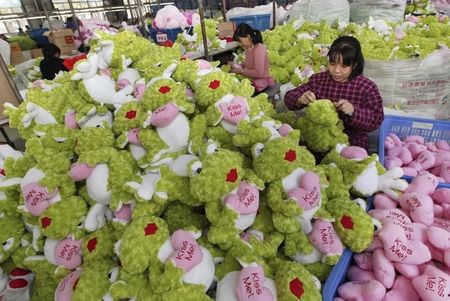BEIJING (Reuters) - China's factories looked to have hit an air pocket in November as a private survey showed output falling for the first time in six months, adding to concerns about slowing economic momentum and to the case for further policy easing from Beijing.
Yet there was a rare glimpse of good news from Japan, which reported surprisingly strong growth in exports for October, a shift that should get a boost from the latest dive in the yen.
The Japanese currency carved out a seven-year trough on the dollar on Thursday and a six-year low on the euro, and seemed set for further losses given the outlook for sustained policy stimulus from the Bank of Japan.
In China, the flow of data was again disappointing as an early reading on HSBC/Markit's manufacturing purchasing managers' index (PMI) showed a drop to a six-month low of 50.0 in November, from 50.4 in October.
A cooling property sector, erratic foreign demand and overcapacity have weighed on its manufacturers and the broader economy this year despite a steady stream of stimulus measures.
China's annual growth slowed to 7.3 percent in the third quarter, leaving 2014 on track to be slowest in 24 years.
"We still see uncertainties in the months ahead from the property market and on the export front. We think more monetary and fiscal easing measures should be deployed." said Hongbin Qu, chief China economist at HSBC.
JAPAN EXPORTS JUMP
The Markit/JMMA version of Japan's PMI was more mixed. While the headline index edged down to 52.1 in November, from 52.4 in October, output expanded at its fastest clip in eight months.
Firms may have been responding to better offshore demand as Japan's exports rose at an annual pace of 9.6 percent in October, more than double market forecasts.
"Exports will contribute to growth in the fourth quarter and help recoup some of the weakness we've seen in Japan's domestic demand," said Shuji Tonouchi senior fixed income strategist at Mitsubishi UFJ Morgan Stanley Securities.
Policymakers were stunned earlier this week when data showed the economy fell into recession in the third quarter as a sales tax hike weighed on consumer spending and business investment.
The grim news underlined the necessity of the BOJ's super-loose policy and sank the yen. The U.S. dollar surged as high as 118.26 yen

Similar flash activity surveys for the euro zone and U.S. economies will be released later in the day.
(Reporting By Jake Spring; Editing by Kim Coghill)